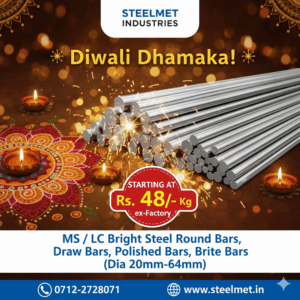In the manufacturing sector, selecting the right #material is crucial. Among the various options available, #steel is a preferred choice across numerous industries.
However, not all steel is created equal. Its #properties and #performance can vary significantly depending on its grade.
In this guide, we’ll explore the different grades of steel and provide essential insights to help you make informed decisions.
#CarbonSteel Grades
One of the most widely manufactured and utilized types of steel is #CarbonSteel, distinguished by its carbon content. It is typically divided into three sub-grades:
Low Carbon Steel (Mild Steel):
Containing less than 0.25% carbon, this type is more #ductile and offers excellent #weldability. It is commonly used in automotive parts, construction, and general applications.Medium Carbon Steel:
With carbon content ranging between 0.25% and 0.60%, it balances strength and ductility, making it ideal for applications like #gears and #structuralsteel.High Carbon Steel:
This grade, with over 0.60% carbon, is known for its #hardness and #wearresistance. It is used in applications requiring high strength, such as #cuttingtools and #springs.
Alloy Steel Grades
Alloy steels contain one or more #alloyingelements like chromium, nickel, tungsten, aluminum, and molybdenum to enhance specific properties. The main types include:
Chromium-Molybdenum Alloy Steel (Cr-Mo):
Renowned for its strength and toughness, this steel is used in #pressurevessels and #structuralapplications.Nickel Alloy Steel:
Adding nickel improves #toughness and #corrosionresistance, making it suitable for low-temperature environments and chemical processing equipment.Stainless Steel:
Containing at least 10.5% chromium, it offers excellent corrosion resistance. Sub-grades like austenitic, ferritic, and martensitic cater to diverse applications such as kitchenware, medical devices, and industrial equipment.
Tool Steel Grades
Tool steels are engineered to withstand high wear and tear, making them ideal for cutting and shaping tools. Key grades include:
Water-Hardening (W-Grades):
Cost-effective steels hardened through water quenching, used in #chisels and #cutters.Cold-Work Steels (O, A, and D-Grades):
Suitable for tools requiring hardness at low temperatures, such as #dies, #punches, and stamping tools.Hot-Work Steels (H-Grades):
Designed for high performance at elevated temperatures, perfect for casting and forging applications.High-Speed Steels (T and M-Grades):
Known for their ability to cut materials at high speeds, commonly used in #drillbits, taps, and #millingcutters.
Specialty Steel Grades
Specialty steels are tailored for applications demanding unique properties. Notable examples include:
Bearing Steel:
High hardness and wear resistance make it ideal for #bearings and high-load applications.Spring Steel:
With high yield strength, this steel retains its shape after bending, used in #springs and high-stress components.Free Machining Steels:
Containing sulfur or lead for improved machinability, they are used in precise automotive and aerospace components.Weathering Steel (Corten):
Forms a protective rust layer, suitable for outdoor structures like #bridges and #sculptures.Electrical Steel:
Used in transformers and motors, offering high magnetic permeability and low electrical losses.
Choosing the Right Steel Grade
When selecting a steel grade, consider the following:
- Application Requirements: Mechanical properties like strength, hardness, and ductility.
- Environmental Conditions: Corrosion resistance for harsh environments.
- Fabrication Process: Ease of machining, welding, or forming.
- Cost Considerations: Balancing performance with budget constraints.
Conclusion
Understanding steel grades is vital for making well-informed purchasing decisions. Whether you need material for automotive parts, construction, or specialized tools, knowing the properties and applications of various grades helps ensure the best choice for your needs.
Ready to discuss your steel requirements? Contact Steelmet Industries today for a free consultation and quote!
| Innovative Steel Solutions for a Better Tomorrow |
Visit our website | Contact Us for Inquiries
#SteelGrades #ManufacturingSolutions #CarbonSteel #AlloySteel #ToolSteel #SpecialtySteel #SteelmetIndustries #CorrosionResistance #SteelApplications


